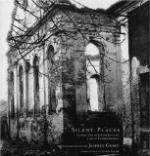“Bo’ jou’, bo’ jou’, Me-en-gen,” said they.
“Bo’ jou’, bo’ jou’,” said he.
He touched two of the men lightly on the shoulder. They arose, for they knew him as the bowsman of the Factor’s canoe, and so understood that Galen Albret desired their presence.
Me-en-gen led the way in silence, across the grass-plot, past the flag-staff, to the foot of the steps leading to the Factory veranda. There the Indian left them. They mounted the steps. A voice halted them in the square of light cast through an intervening room from a lighted inner apartment.
The veranda was wide and low; railed in; and, except for the square of light, cast in dimness. A dozen men sat in chairs, smoking. Across the shaft of light the smoke eddied strangely. A woman’s voice accompanied softly the tinkle of a piano inside. The sounds, like the lamplight, were softened by the distance of the intervening room.
Of the men on the veranda Galen Albret’s identity alone was evident. Grim, four-square, inert, his very way of sitting his chair, as though it were a seat of judgment and he the interpreter of some fierce blood-law, betrayed him. From under the bushy white tufts of his eyebrows the woodsmen felt the search of his inspection. Unconsciously they squared their shoulders.
The older had some fifty-five or sixty years, though his frame was still straight and athletic. A narrow-brimmed slouch hat shadowed quiet, gray eyes, a hawk nose, a long sweeping white mustache. His hands were tanned to a hard mahogany-brown carved into veins, cords, and gnarled joints. He had kindly humour in the wrinkles of his eyes, the slowly developed imagination of the forest-dweller in the deliberation of their gaze, and an evident hard and wiry endurance. His dress, from the rough pea-jacket to the unornamented moccasins, was severely plain.
His companion was hardly more than a boy in years, though more than a man in physical development. In every respect he seemed to be especially adapted to the rigours of northern life. The broad arch of his chest, the plump smoothness of his muscles, above all, the full roundness of his throat indicated that warmth-giving blood, and plenty of it, would be pumped generously to every part of his body. His face from any point of view but one revealed a handsome, jaunty boy, whose beard was still a shade. But when he looked at one directly, the immaturity fell away. This might have been because of a certain confidence of experience beyond what most boys of twenty can know, or it might have been the result merely of a physical peculiarity. For his eyes were so extraordinarily close together that they seemed by their very proximity to pinch the bridge of his nose, and in addition, they possessed a queer slant or cast which twinkled perpetually now in one, now in the other. It invested him at once with an air singularly remote and singularly determined. But at once when he looked away the old boyishness returned, enhanced further by a certain youthful barbarity in the details of his dress—a slanted heron’s feather in his hat, a beaded knife-sheath, an excess of ornamentation on his garters and moccasins, and the like.




